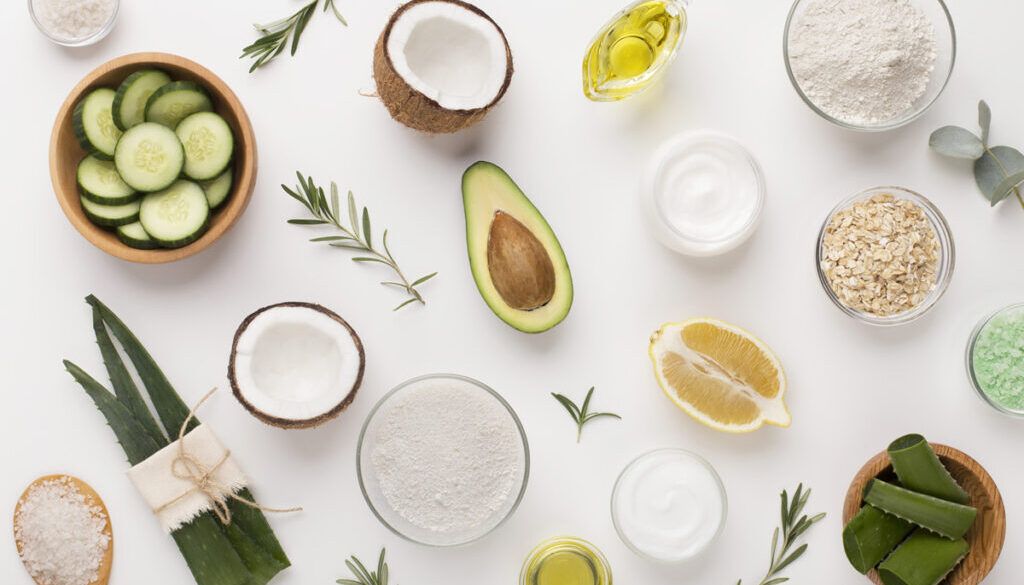The path of organic ingredients from farm to face
*Read the original article here: https://medium.com/@yogalakshmivellaisamy03/the-path-of-organic-ingredients-from-farm-to-face-7e4ddd87ec22
By Yogalakshmivellaisamy
In an age where consumers are increasingly conscious of what they put on their skin, the demand for organic skincare products is on the rise. This shift towards natural and organic ingredients isn’t just a passing trend; it reflects a deeper understanding of the benefits of using products derived from nature.
Organic farming is a holistic approach to agriculture that emphasizes the use of natural methods and techniques to cultivate crops and raise livestock. Unlike conventional farming, which relies heavily on synthetic pesticides, fertilizers, and genetically modified organisms (GMOs), organic farming focuses on maintaining soil health, biodiversity, and ecological balance. Key principles of organic farming include crop rotation, composting, natural pest control, and avoiding the use of synthetic chemicals.
Cultivating the source
Organic farming isn’t just revolutionizing the way we grow our food; it’s also making a significant impact on the cosmetics industry. As consumers become more conscious of what they put on their bodies, the demand for organic and natural ingredients in skincare, haircare, and beauty products is on the rise. This shift towards organic farming practices in cosmetics not only benefits our skin but also contributes to a more sustainable and eco-friendly beauty industry. At the heart of organic cosmetics lies a commitment to using ingredients that are cultivated without synthetic pesticides, herbicides, or genetically modified organisms. Organic farmers prioritize soil health and biodiversity, resulting in plants that are rich in nutrients and free from harmful chemical residues. By sourcing ingredients from organic farms, cosmetic companies can ensure that their products are not only safe and effective but also environmentally sustainable. One of the key benefits of using organic ingredients in cosmetics is their purity and potency. Organic plants are grown in nutrient-rich soil without the use of synthetic fertilizers, which means they are able to absorb more vitamins, minerals, and antioxidants from the earth. This results in skincare products that are more nourishing and beneficial for the skin, promoting a healthy complexion and natural radiance. Furthermore, organic farming practices help to support biodiversity and protect ecosystems. By avoiding the use of synthetic chemicals, organic farmers create habitats that are conducive to a wide range of plant and animal species. This not only enhances the health of the environment but also ensures the long-term viability of agricultural land for future generations. In addition to being better for our bodies and the environment, organic cosmetics also contribute to the well-being of farmers and communities around the world. By supporting organic farming practices, cosmetic companies are investing in fair labor practices, sustainable livelihoods, and rural development initiatives. This helps to create economic opportunities and improve the quality of life for farmers and their families, empowering communities to thrive.
Harvesting the care
Harvesting with care begins on the farm, where plants are carefully tended to and harvested at the peak of their potency. This ensures that the botanicals retain their maximum nutritional value and efficacy, resulting in skincare products that deliver real results. By working in harmony with nature, farmers are able to harness the power of plants to nourish and rejuvenate the skin without compromising the health of the environment. Once harvested, the botanicals embark on a journey from the farm to the processing facilities, where they are transformed into skincare ingredients. It’s crucial that this journey is handled with care to preserve the integrity of the ingredients and minimize environmental impact. From sustainable transportation methods to eco-friendly processing techniques, every step of the supply chain must uphold the principles of sustainability and ethical sourcing. Transparency is also key in the farm-to-face approach. Consumers are increasingly seeking out brands that are transparent about their sourcing practices and ingredient origins. By providing detailed information about where their ingredients come from and how they are harvested, skincare companies can build trust with consumers and demonstrate their commitment to quality and sustainability. Ultimately, harvesting with care is about more than just creating effective skincare products; it’s about fostering a deeper connection to the earth and the communities that rely on it. By supporting farmers who prioritize sustainability and ethical practices, we can not only nourish our skin but also contribute to a healthier planet and a more equitable society.
Process and extraction
Processing begins with the careful selection of raw materials sourced directly from organic and sustainable farms. These farms prioritize soil health, biodiversity, and ethical practices, ensuring that the plants are cultivated in an environment free from harmful chemicals and pesticides. By starting with high-quality ingredients, skincare companies lay the foundation for products that deliver real results without compromising the health of the skin or the planet. Once harvested, the botanicals undergo various extraction methods to isolate the active compounds that benefit the skin. These extraction techniques can range from traditional methods like cold pressing and steam distillation to more modern approaches such as supercritical fluid extraction and CO2 extraction. Each method has its advantages and is chosen based on factors such as the plant material being used and the desired properties of the final product. Cold pressing, for example, is often used for oils and fatty substances, as it involves pressing the plant material at low temperatures to extract the oil without compromising its nutritional value. Steam distillation, on the other hand, is ideal for extracting essential oils from aromatic plants, using steam to gently release the volatile compounds without damaging them. Supercritical fluid extraction, a more advanced technique, utilizes carbon dioxide under high pressure to extract the desired compounds from the plant material. This method is particularly effective for extracting delicate compounds like antioxidants and phytochemicals, while also being environmentally friendly and solvent-free. Regardless of the extraction method used, the goal is always the same: to preserve the integrity and efficacy of the natural ingredients. Skincare companies invest in state-of-the-art equipment and stringent quality control measures to ensure that the processing is carried out with the utmost care and precision.Once the extracts are obtained, they are carefully formulated into skincare products that harness the power of nature to nourish and rejuvenate the skin. From cleansers and serums to moisturizers and masks, each product is crafted with a deep understanding of how botanical ingredients can support and enhance skin health.
Fair trade and ethical sourcing
Fair trade principles dictate that farmers and workers receive fair wages, safe working conditions, and opportunities for development and empowerment. In the context of farm-to-face skincare, this means partnering directly with farmers and cooperatives who uphold these standards, often in marginalized or economically disadvantaged regions. By paying fair prices for their crops and investing in community projects, skincare companies can make a tangible difference in the lives of those who grow and harvest the ingredients. Ethical sourcing goes hand in hand with fair trade, encompassing a broader set of principles that prioritize environmental sustainability, cultural preservation, and social responsibility. It involves carefully selecting suppliers who adhere to rigorous standards for environmental protection, biodiversity conservation, and ethical labor practices. By working with suppliers who share their values, skincare companies can ensure that their products are not only safe and effective but also aligned with their commitment to sustainability and social justice. One of the key benefits of fair trade and ethical sourcing in farm-to-face skincare is the transparency it provides to consumers. By providing detailed information about where their ingredients come from and how they are sourced, skincare companies empower consumers to make informed choices that align with their values. This transparency builds trust and fosters a deeper connection between consumers and the products they use, knowing that their purchases support fair wages, sustainable agriculture, and community development.
Quality control and certification
Quality control begins at the source, with careful selection of raw materials sourced from organic and sustainable farms. These farms adhere to strict guidelines for soil health, biodiversity, and ethical practices, ensuring that the plants are cultivated without synthetic pesticides, herbicides, or genetically modified organisms. By starting with high-quality ingredients, skincare companies lay the foundation for products that are not only effective but also safe and environmentally friendly. Once harvested, the botanicals undergo rigorous testing to verify their purity, potency, and safety. This includes testing for contaminants such as heavy metals, pesticides, and microbial pathogens, as well as analysis of the active compounds that benefit the skin. Skincare companies invest in state-of-the-art laboratories and equipment to conduct these tests, ensuring that their products meet the highest quality and safety standards. Certification plays a crucial role in ensuring transparency and trust in the farm-to-face skincare industry. Organic certification, for example, verifies that ingredients have been grown and processed according to strict organic standards, free from synthetic chemicals and genetically modified organisms. Fair trade certification ensures that farmers and workers receive fair wages and safe working conditions, while also promoting environmental sustainability and community development.
Packing and sustainability
Traditional skincare packaging often involves single-use plastics and non-recyclable materials that end up in landfills or polluting our oceans. In contrast, sustainable packaging options prioritize materials that are renewable, biodegradable, or easily recyclable. This includes glass bottles and jars, which can be recycled indefinitely without losing quality, as well as paper and cardboard packaging made from recycled or sustainably sourced fibers. Another key consideration in sustainable packaging is reducing the overall amount of packaging used. Skincare companies are embracing minimalist design principles and innovative packaging solutions to minimize waste and maximize efficiency. This may include using refillable containers, reducing excess packaging layers, and opting for lightweight materials that require less energy to transport. In addition to choosing eco-friendly materials, skincare companies are also exploring alternative packaging innovations that push the boundaries of sustainability. This includes biodegradable packaging made from plant-based materials such as cornstarch or bamboo, as well as compostable packaging that breaks down naturally in a home composting system. These innovations not only reduce the environmental footprint of skincare products but also inspire other industries to rethink their approach to packaging.
Connecting with conscious consumers
Engaging with conscious consumers goes beyond simply selling products it’s about building relationships based on trust, authenticity, and shared values. Skincare companies are leveraging social media, storytelling, and community events to connect with their audience on a deeper level. By sharing behind-the-scenes glimpses of their farms, production facilities, and ingredient sourcing trips, companies are inviting consumers into their world and fostering a sense of connection and trust. Furthermore, conscious consumers are driving demand for innovation and accountability in the skincare industry. They’re pushing for greater transparency, stricter regulations, and higher standards for ingredient sourcing and product safety. Skincare companies are responding by investing in research and development, exploring new sustainable technologies, and advocating for policies that promote transparency and consumer protection.
The journey of an organic ingredient from farm to face is a multifaceted process that intertwines nature, science, ethics, and consumer consciousness. Each step along the way from cultivation to formulation to packaging is imbued with care and consideration for the planet, people, and the well-being of our skin. By choosing organic skincare products, we not only nourish our skin with the goodness of nature but also contribute to a more sustainable and ethical beauty industry.



